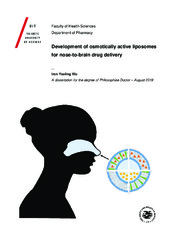Blar i forfatter "Wu, Iren Yeeling"
-
Can nanomedicine improve the semen quality? The potentials of liposomal curcumin.
Wu, Iren Yeeling (Master thesis; Mastergradsoppgave, 2015-05-13)INTRODUCTION: Worldwide, 10-15 % couples are infertile, and 50 % of the couples seeking assisted reproductive techniques do so because of defective sperm quality. The semen quality can be directly linked to oxidative stress (OS). Due to high metabolic rates and weak anti-oxidant systems, sperm cells are unable to defend against OS produced exogenously and endogenously. Vitamin C and/or vitamin E are ... -
Development of osmotically active liposomes for nose-to-brain drug delivery
Wu, Iren Yeeling (Doctoral thesis; Doktorgradsavhandling, 2019-11-22)The brain as a drug target site remains a pharmaceutical challenge in spite of numerous efforts to enhance drug delivery to the brain. Nasal drug administration has gained interest among researchers, especially in the last decade, as it provides direct drug access into the brain. However, the nasal mucus and the surrounding environment often limit the use of nose as the administration site. Drug ... -
The hypotonic environmental changes affect liposomal formulations for nose-to-brain targeted drug delivery
Wu, Iren Yeeling; Nikolaisen, Trygg Einar; Skalko-Basnet, Natasa (Journal article; Tidsskriftartikkel; Peer reviewed, 2019-03-16)Systemic administration of drugs is ineffective in the treatment of central nervous system disorders because of the blood-brain barrier. Nasal administration has been suggested as an alternative administration route as drugs absorbed in the olfactory epithelium bypass the blood-brain barrier and reach the brain within minutes. However, the nasal mucosa properties (e.g., tonicity, pH) are not constant ... -
Interpreting non-linear drug diffusion data: Utilizing Korsmeyer-Peppas model to study drug release from liposomes
Wu, Iren Yeeling; Bala, Sonali; Skalko-Basnet, Natasa; Di Cagno, Massimiliano Pio (Journal article; Tidsskriftartikkel; Peer reviewed, 2019-07-30)The aim of this work was to clarify the dynamics behind the influence of ionic strength on the changes in drug release from large unilamellar vesicles (LUVs). For this purpose, we have investigated the transport of two different model drugs (caffeine and hydrocortisone) formulated into liposomes through different types of barriers with different retention properties (regenerated cellulose and the ...


 English
English norsk
norsk


